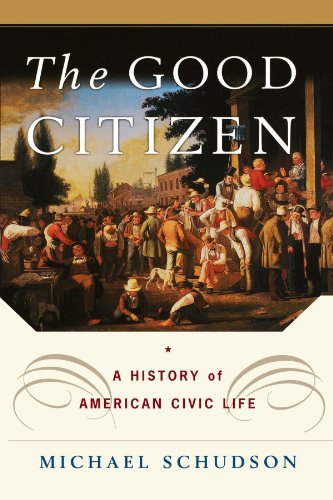Description
In 1996 less than half of all eligible voters even bothered to vote. Fewer citizens each year follow government and public affairs regularly or even think they should. Is popular sovereignty a failure?
Not necessarily, argues Michael Schudson in this provocative and unprecedented history of citizenship in America. Measuring voter turnout or attitudes is a poor approximation of citizenship. The meaning of voting -- and what counts as politics -- has changed dramatically over the course of our history. We have passed through three distinct eras in the definition and demonstration of good citizenship, and we are now struggling to find a footing in a fourth.
When the nation was founded, being a citizen meant little more than for property-owning white males to delegate authority to a local gentleman -- and accept his complimentary glass of rum on election day. This "politics of assent" gave way early in the nineteenth century to a "politics of parties." Parties conducted elaborate campaigns of torchlight processions and monster meetings; voting day was filled with banter, banners, fighting, and drinking. Party ticket peddlers handed voters preprinted tickets to place in the ballot box before stepping over to the tavern for a few dollars reward from the party. We now call this corruption. At the time, it was called loyalty.
The third model of citizenship, ushered in by Progressive reformers, was a "politics of information." Campaigning became less emotional and more educational. Voting was by secret ballot. With civil-service reform, parties were limited in the rewards they could bestow. This was the era of the "informed voter." Under this scheme, the twentieth century has been ruled by everyone, and no one, all at once.
Today, after the rights revolution, political participation takes place in schools, at home, at work, and in the courts. We have made "informed citizenship" an overwhelming task. Schudson argues that it is time for a new model, in which we stop expecting everyone to do everything. The new citizenship must rest on citizens who are monitors of political danger rather than walking encyclopedias of governmental news. This fascinating tour of the past makes it possible to imagine a very different -- and much more satisfying -- future."What are the characteristics and practices that mark a good citizen in the United States?" asks author Michael Schudson, a professor at the University of California at San Diego. He s not entirely sure--this is not a book of ready conclusions--but he performs a helpful service in describing the evolution of voting as both an idea and practice in American history. During the colonial period, for example, white male property owners (nobody else had the vote) casually reaffirmed a strict social hierarchy. In the 19th century, political parties dominated public life and energized local communities. In the 20th century, the Progressive Era notion of "informed voters" took root and essentially privatized citizenship. Schudson generally likes the way in which American citizenship has evolved, especially toward more openness, but he s decidedly ambivalent about where it might be headed--a regime of rights and entitlements in which the personal is inevitably political. --John J. Miller
Customer FAQs:
Question: I want to order 100% authentic The Good Citizen: A History of Amer… from your store. How I can place my order in Pakistan?
Answer: Our products are 100% imported and authenticated. To place order just either contact with us or place your order online. One of our sales person contact with you.
Question: Do you have physical store of The Good Citizen: A History of Amer… in Pakistan?
Answer: No, you can only place order online because we import from USA as get order.
Question: How much more time you will take to deliver, once you get my order?
Answer: After order confirmation we do our best to deliver in 3 to 4 week.
Question: All prices are connfirm and accurate? How I can get exact The Good Citizen: A History of Amer… price in Pakistan?
Answer: We do our best to list exact prices of all products but since dollar fluctuate in Pakistan so sometime we update at the time of order confirmation.
Question: Is there some discount I will get at the time of placing order?
Answer: For discount we usually send discount coupons. To get discount coupons of The Good Citizen: A History of Amer… you can sign up our newsletter.
High Quality Goods
We are sourcing products from leading websites in the USA to ensure the highest quality for our end product.
Support
We have a team of professional sales representatives who will assist you in identifying the right products from Amazon.
Express Shipping
Upon receiving your order, we will expedite the shipping process by placing the order promptly and ensuring timely dispatch from the USA.
Secure Payments
Your payment will be securely held with us, and in the event that you receive an incorrect or damaged product, we will issue a refund.

